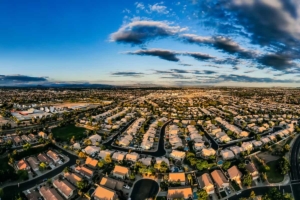Because of its well-earned reputation as a highly competitive market, the prospect of buying or renting an apartment in New York City can be daunting. For foreigners who wish to own a piece of the Big Apple, this challenge is compounded by the lack of a financial history that American citizens build over the years.
However, it is still possible. Thousands of non-citizens rent and buy property in New York City, whether they are short- or long-term residents, or use it as a second home or investment property. Unlike in other countries, the U.S. government does not restrict access to real estate for foreign investors: you do not have to live in the U.S. or hold a certain type of visa to buy an apartment in New York.
NYC is historically one of the most stable real estate markets in the world and buying property there could be an excellent investment even if you don’t plan to live there long-term. In addition, despite the high prices, the real estate market remains more affordable than in other cities such as London, Hong Kong or Paris.
Whatever your intentions, the Tilly Real Estate Group is here to answer your questions about buying or selling real estate in Manhattan, Brooklyn or any of the other boroughs in New York. Our guide also provides information on some of the most common questions foreigners have about finding a home in New York City.
What do I Need to Know Before Buying a Property in New York as a Foreign Citizen?
If you want to buy a home in New York City, either to live in or as an investment, there are several types of homes to choose from: condominiums, co-ops or townhouses. Each type of property has its own regulations and requirements. Although the U.S. government does not restrict non-native investment in the real estate market, foreign nationals may face certain difficulties depending on the type of property they hope to purchase.
Condominiums and co-ops are the most common type of housing in New York City – we tell you more about them here. Although co-ops make up the vast majority of the real estate market in New York City, the boards of these buildings severely limit who can buy these apartments.
They most often require that the owners live and work in New York City, but also that they be able to show a financial history in the United States and a high credit rating. In addition, the vast majority of them do not allow rentals. Closing the sale transaction can be a lengthy and difficult process, which can present obstacles for individuals who live abroad or who do not plan to live in New York City long-term.
Condos represent a relatively small (25%) but growing share of New York City housing. While they can be more expensive than co-ops, they are often a more affordable option for those hoping to sell or rent their property in the short to medium term. Finally, townhouses offer the most flexibility but are few and far between and extremely expensive.
Choosing the area in which you plan to live is also very important. Not only does it have to meet your lifestyle requirements, but families with children must also consider the school map. If you want your children to continue their education in French, especially if you hope to take advantage of one of the free bilingual programs offered in some New York City public schools, you will need to own or rent property within the school district that is attached to it.
Because of these considerations, we strongly recommend that you use the services of a real estate agent in nyc who is familiar with the different neighborhoods of New York, but who is also used to working with foreigners.
In New York, these services are free to buyers: sellers pay the full agency fee, which is then divided between the real estate agent working for the seller and the one working for the buyer. Real estate agents are also legally required by the Real Estate Board of New York to share their real estate listings within 24 hours, which makes the real estate market more transparent than in many other countries, including France. We therefore recommend that you work exclusively with one real estate agent to simplify the search process.
What do you Need to Rent or Buy an Apartment in New York?
If you are going to live and work in New York, one of the first steps in your expatriation will be to acquire a Social Security number which you will need to rent or buy an apartment. However, if you are not eligible – if you do not live and work in the United States for example – you will need to apply for an Individual Taxpayer Identification Number.
Unless you are able to pay cash for your entire purchase, you will also have to finance a portion of your real estate purchase.
Financing a Property in the United States as a Foreigner
An all-cash offer to purchase is preferred whenever possible. This will allow you to save on costs related to mortgage fees, real estate appraisal and title insurance. In addition, many sellers prefer these offers as they are not subject to financial constraints.
However, the vast majority of buyers in the United States, whether they are U.S. citizens or foreigners, use home loans. While it is far from impossible to obtain a mortgage, it is more difficult for expatriates and non-citizens. The main reason for this is that they do not have a credit score.
This is one of the main elements of a financial history in the United States and is used by credit institutions to judge whether or not potential clients are an acceptable risk, as well as the interest rate to be charged. Your credit score represents your ability to borrow and is built up over several years by taking into account many elements, such as your credit history, payment history, acquired debt compared to your income, etc.
If you are a newcomer to the United States or a non-resident and therefore do not have a credit rating, banks and other lending institutions will have higher lending standards. Their demands will include a higher than average down payment (40% or more versus 20% for US residents), higher interest rates, etc.
They may also require proof of funds. They may also require proof of funds and references from major financial institutions, or ask that you deposit a specific amount of money into an account held by their institution. Some banks have more experience than others with foreigners and will be more likely to deal with non-US nationals.
An alternative is to take out a loan with your local bank. The terms of this loan will depend on your situation, but your offer will be considered a cash offer in the United States.
The rental property market in New York is very competitive. Although it is illegal to discriminate against anyone on the basis of citizenship, your credit rating – or lack thereof – as a foreigner may work against you if you wish to rent an apartment. Common rental requirements in New York include proof of employment, U.S. income tax returns for the previous two years, and an excellent credit rating.
Many landlords also require tenants to have an annual income of 40 times the monthly rent. In the absence of a satisfactory record, landlords may require tenants to pay two to six months’ rent in advance, or use a guarantor. Guarantor requirements are also very strict – guarantors must frequently reside in New York, New Jersey, or Connecticut and have an income of 80 times the monthly rent, for example – leading many foreigners to use services such as Insurent, the Guarantors, or Hello Rented.
What Property Taxes are Non-US citizens Subject to in New York?
Good news for foreigners wishing to buy property in NYC: unlike other cities such as Hong Kong or London, there is no tax on non-US property investments in New York. However, they will have to consider certain taxes if they wish to transfer title. The Foreign Investment in Real Property Tax Act of 1980 (also known as FIRPA) authorizes the government to withhold 15% of the proceeds from sales, exchanges, gifts, transfers and liquidations of foreign-owned property.
In addition, they are subject to a higher estate tax: while U.S. citizens are exempt for assets valued at less than $5.6 million ($11.2 million for married couples), foreigners are not exempt above $60,000.
We strongly recommend that you consult a tax expert in the United States and in your home country before purchasing property in New York to determine how the purchase will affect your taxes in each country and how best to manage your assets.
Conclusion
Although buying or renting an apartment in New York City as a foreigner can present some difficulties, it is still feasible and is also an excellent investment. Our team of experienced real estate agents is extremely familiar with the specifics of buying or renting real estate for non-citizens in NYC. We are also able to manage your property over the long term, including after your return, making your purchase a valuable asset in your long-term investment portfolio.




